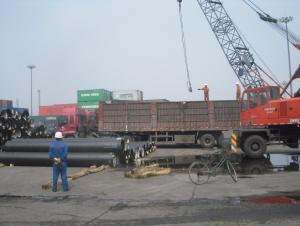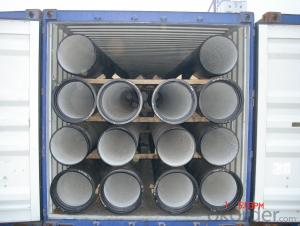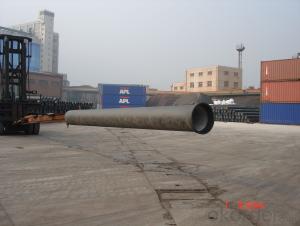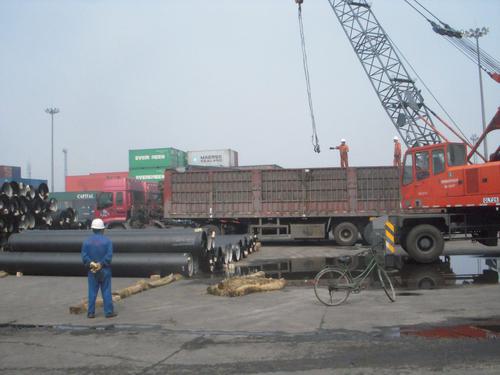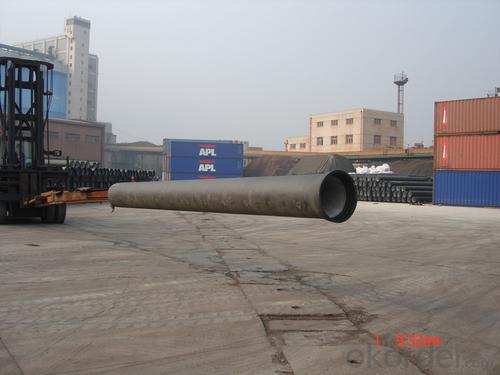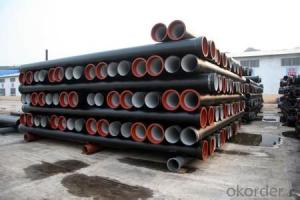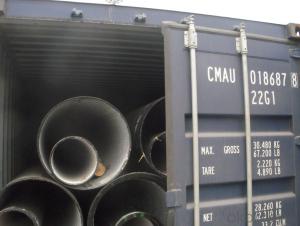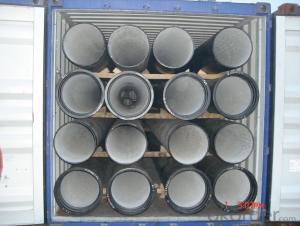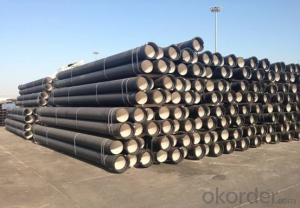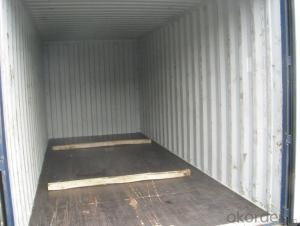DUCTILE IRON PIPES K8 DN400
- Loading Port:
- China Main Port
- Payment Terms:
- TT OR LC
- Min Order Qty:
- -
- Supply Capability:
- -
OKorder Service Pledge
OKorder Financial Service
You Might Also Like
Ductile Iron Cast Pipe is without any defects compare with tradition casting tech, which has many advantages particularly as follow:
(1) High density. In the "vertical upward casting" process, the melt iron of centre liquid column in center crystallizer is continuously feeding for volume shrinkage caused by condensation tube at outer circumference , which lead to be free of shrinkage porosity.
(2) High purity. When melt iron pouring, the mixed impurities such as gas, dross, sand grain which are lighter than melt iron could be eliminated at furnace mouth, its impossible to enter into the crystallizer through the channel, so the melt iron into the crystallizer is very pure.
(3) Strength with toughness. The cooling speed provided by continuous crystallizer is 30 times than sand casting and 5 times than centrifugal casting, and doesn't produce white iron, the eutectic cell volume of continuous cast iron is one eighth to one tenth compare with traditional cast iron. The density of graphite nodule in ductile iron can reach 300-700 pcs/mm2. Therefore, all reason above improve the strength and toughness of continuous cast iron.
(4) Free machining. The high speed cooling make the hardening phase (such as boride, steadite) not appear like reticular, massive or thick, but diffuse like fish bone and pane in shape, moreover, there are tiny graphite flakes inlaid hardening phase. It's free machining in BrinellHardness the range of 250-300HB. However, the Brinell Hardness of 250 is top limit to common metal materials.
(5) Uniform composition of tube wall. The convection mixing of liquid column caused by marching type drawing in crystallizer make the composition of tube wall well-distributed, and concentration gradient very little.
(6) High productivity. To the wall thickness of tube under 10mm, the speed of continuous casting is 1 meter/min, to the wall thickness of tube under 20mm, the speed of continuous casting is 0.5 meter/min, which is high efficiency that centrifugal or other casting tech couldn't reach.
- Q: How does ductile iron pipe perform in high-temperature environments?
- Due to its unique properties and characteristics, ductile iron pipe performs exceptionally well in high-temperature environments. It is known for its high strength, toughness, and durability, making it suitable for various applications that involve elevated temperatures. One of the main advantages of ductile iron pipe in high-temperature environments is its ability to withstand thermal expansion and contraction. With a low coefficient of thermal expansion, the material can handle significant temperature fluctuations without suffering detrimental effects. This ensures that the pipe remains structurally stable, avoiding deformation or cracking when exposed to high temperatures. Moreover, ductile iron pipe exhibits excellent thermal conductivity, allowing it to efficiently transfer heat. This prevents the accumulation of excessive heat and reduces the risk of thermal stress. Additionally, its high thermal conductivity enables it to dissipate heat quickly, ensuring that the pipe remains within safe operating temperatures. Furthermore, ductile iron pipe has a high melting point of approximately 2200°F (1200°C). This characteristic guarantees that the pipe maintains its structural integrity even in extremely high-temperature environments, making it capable of effectively handling hot fluids, steam, and other substances at elevated temperatures without compromising performance. Another crucial aspect is the corrosion resistance of ductile iron pipe. It is commonly coated with protective linings, such as cement mortar or epoxy, which act as a barrier against corrosion caused by high temperatures. These linings prevent direct contact between the pipe and corrosive substances, thereby ensuring the pipe's longevity in high-temperature environments. In conclusion, ductile iron pipe is an excellent choice for high-temperature environments due to its exceptional strength, thermal stability, thermal conductivity, and corrosion resistance. Its ability to withstand thermal expansion, high melting point, and efficient heat transfer properties make it a reliable and durable option for various applications in such conditions.
- Q: Do ductile iron pipes require additional protection against external factors?
- It is necessary to provide extra protection for ductile iron pipes due to external factors. Despite being strong and durable, ductile iron pipes are susceptible to corrosion and other threats that can cause pipe failure. The primary external factor that ductile iron pipes require protection from is corrosion. Corrosion can weaken the pipe over time and is caused by certain chemicals present in soil or water. To prevent corrosion, ductile iron pipes are often coated with substances like polyethylene or zinc. This coating acts as a barrier, safeguarding the pipe against corrosive elements and prolonging its lifespan. In addition to corrosion, ductile iron pipes may also need protection against physical damage. These pipes are typically buried underground, making them vulnerable to forces like heavy machinery, ground movement, and vandalism. To protect against physical damage, ductile iron pipes can be encased in concrete or surrounded by a protective sleeve or casing. Furthermore, ductile iron pipes may require protection against soil conditions that can lead to pipe movement or shifting. In areas with unstable soil, it may be necessary to implement measures such as proper bedding and backfilling techniques, as well as the use of anchoring devices. These measures ensure the stability and integrity of the pipes. To conclude, although ductile iron pipes are strong, they still need additional protection against external factors. This includes preventing corrosion, protecting against physical damage, and addressing soil conditions. By implementing these protective measures, the lifespan and performance of ductile iron pipes can be significantly extended, ensuring the reliable transportation of water and other fluids.
- Q: Are ductile iron pipes resistant to abrasion or wear?
- Indeed, ductile iron pipes exhibit remarkable resistance against abrasion and wear. Renowned as cast iron as well, ductile iron represents a robust and enduring substance exclusively crafted to endure abrasive circumstances. Ductile iron's distinct microstructure grants superb resistance to abrasion, rendering it an optimal selection for scenarios wherein pipelines face extensive levels of wear. Furthermore, the extended lifespan of ductile iron pipes showcases their enduring capacity against abrasion and wear throughout time.
- Q: Can ductile iron pipes be used for underground chemical processing systems?
- Ductile iron pipes are generally not recommended for use in underground chemical processing systems due to their limited resistance to corrosion from various chemicals. While ductile iron pipes are known for their strength, durability, and flexibility, they are still vulnerable to corrosion when exposed to certain chemicals, especially those with high acidity or alkalinity. In underground chemical processing systems, there is a higher risk of exposure to corrosive substances that can deteriorate the ductile iron pipes over time. This can lead to leaks, cracks, and failures in the piping system, compromising its integrity and potentially causing hazardous conditions. For underground chemical processing systems, it is advisable to consider alternative materials that are more resistant to corrosion, such as stainless steel, PVC, or high-density polyethylene (HDPE) pipes. These materials offer superior chemical resistance and can withstand the harsh conditions typically present in chemical processing environments. It is crucial to consult with experts in chemical engineering, piping design, and corrosion resistance to determine the most suitable materials for underground chemical processing systems. Proper material selection is vital to ensure the longevity and safety of the piping infrastructure in such environments.
- Q: Can ductile iron pipes be used for dam construction?
- Yes, ductile iron pipes can be used for dam construction. Ductile iron pipes are known for their strength, durability, and corrosion resistance, making them suitable for a wide range of applications, including dam construction. These pipes can withstand high pressure, making them ideal for transferring water or other fluids within the dam structure. Additionally, their ability to withstand external loads and ground movement makes them a reliable choice for the construction of dams. Ductile iron pipes are also relatively easy to install and maintain, further adding to their suitability for dam construction projects.
- Q: How do ductile iron pipes perform in high-pressure applications?
- Ductile iron pipes are known for their exceptional strength and durability, making them highly suitable for high-pressure applications. These pipes are designed to withstand immense internal and external pressures, making them well-suited for underground or above-ground installations where high-pressure conditions are expected. One of the key advantages of ductile iron pipes in high-pressure applications is their ability to resist cracking or bursting. The inherent ductility of the material allows it to absorb and distribute the pressure evenly, minimizing the risk of failure under high-pressure conditions. This makes ductile iron pipes a reliable choice for water supply systems, oil and gas pipelines, and other applications where the pipe is subjected to significant pressure. Additionally, ductile iron pipes have excellent corrosion resistance properties, which further enhances their performance in high-pressure environments. The pipes are typically coated with a protective layer, such as cement mortar or epoxy, which acts as a barrier against corrosion. This protective coating prevents the formation of rust or scale inside the pipe, ensuring a smooth flow and maintaining the structural integrity even under high-pressure conditions. Furthermore, ductile iron pipes have a high tolerance for external loads, such as soil pressure, traffic loads, or other external forces. This strength enables them to withstand the additional stress that may be present in high-pressure applications, ensuring the long-term reliability and performance of the pipe system. Overall, ductile iron pipes offer exceptional performance in high-pressure applications. Their strength, durability, corrosion resistance, and ability to withstand external loads make them a reliable choice for various industries and infrastructure projects where high-pressure conditions are a concern.
- Q: Can ductile iron pipes be used in coastal or marine environments?
- Yes, ductile iron pipes can be used in coastal or marine environments. Ductile iron is a type of cast iron that has been treated with magnesium to give it enhanced strength, ductility, and resistance to corrosion. This makes it suitable for use in environments with high levels of moisture, such as coastal or marine areas. Coastal and marine environments are known for their high levels of saltwater, which can cause corrosion in metal pipes. However, ductile iron pipes have excellent corrosion resistance due to their protective coating. This coating acts as a barrier between the pipe and the corrosive elements present in saltwater, preventing the formation of rust and extending the lifespan of the pipes. Furthermore, ductile iron pipes can withstand the high pressures and stresses associated with coastal and marine applications. They have a high tensile strength, allowing them to handle the weight of soil, rocks, and other materials that may be present in these environments. Additionally, ductile iron pipes are resistant to damage from external forces, such as waves or debris, making them a reliable choice for coastal or marine projects. In summary, ductile iron pipes are a suitable choice for coastal or marine environments due to their corrosion resistance, high tensile strength, and durability. They can reliably transport water or other fluids in these challenging environments while maintaining their structural integrity over an extended period of time.
- Q: How do ductile iron pipes handle seismic movements?
- Ductile iron pipes are designed to withstand seismic movements due to their inherent flexibility and high tensile strength. The material's ductility allows it to bend and deform without fracturing, making it more resistant to stress and strain caused by seismic activity. Additionally, the pipes are typically installed with flexible joints that can absorb and accommodate the movement, further reducing the risk of damage or failure during earthquakes. Overall, ductile iron pipes are a reliable choice for underground infrastructure in seismic-prone areas.
- Q: Can ductile iron pipes be used in tunneling or microtunneling projects?
- Yes, ductile iron pipes can be used in tunneling or microtunneling projects. Ductile iron pipes are known for their strength, durability, and flexibility, making them suitable for underground applications. They can withstand the external pressure exerted by the surrounding soil or rock during tunneling, ensuring the integrity and safety of the project. Additionally, ductile iron pipes have excellent corrosion resistance properties, which is crucial in tunneling projects where the pipes are exposed to moisture and other corrosive elements. Their smooth internal surface also facilitates the flow of fluids or materials through the pipes, making them an ideal choice for tunneling or microtunneling projects.
- Q: How do ductile iron pipes perform in freeze-thaw cycles?
- Ductile iron pipes demonstrate exceptional performance in freeze-thaw cycles due to their material properties. With high tensile strength and excellent impact resistance, ductile iron is highly resistant to the stresses caused by freezing and thawing. Unlike other materials, these pipes can withstand the expansion and contraction during temperature changes without cracking or breaking. One of the primary reasons for the success of ductile iron pipes in freeze-thaw conditions is their capacity to absorb and dissipate stresses. The material's high ductility allows for slight deformation under stress, releasing pressure and preventing pipe damage. This characteristic ensures that the pipes can endure repeated freezing and thawing cycles without compromising their structural integrity. Furthermore, ductile iron pipes feature a durable and protective coating, such as cement mortar lining or polyethylene encasement, which further enhances their resistance to freeze-thaw cycles. These coatings offer an extra layer of protection, preventing direct contact between water and the iron and reducing the risk of corrosion. Moreover, ductile iron pipes have an extended service life, often exceeding 100 years, thanks to their inherent strength and resistance to various environmental factors, including freeze-thaw cycles. The pipes' ability to endure these cycles without significant damage ensures the reliability and durability of water distribution systems, even in regions prone to freezing temperatures. In conclusion, ductile iron pipes are highly dependable and excel in freeze-thaw cycles. Their high tensile strength, impact resistance, capacity to absorb stresses, and protective coatings make them the preferred choice for water distribution systems in areas with harsh winter conditions.
Send your message to us
DUCTILE IRON PIPES K8 DN400
- Loading Port:
- China Main Port
- Payment Terms:
- TT OR LC
- Min Order Qty:
- -
- Supply Capability:
- -
OKorder Service Pledge
OKorder Financial Service
Similar products
Hot products
Hot Searches
Related keywords
